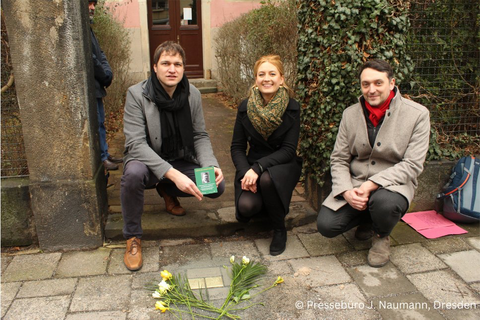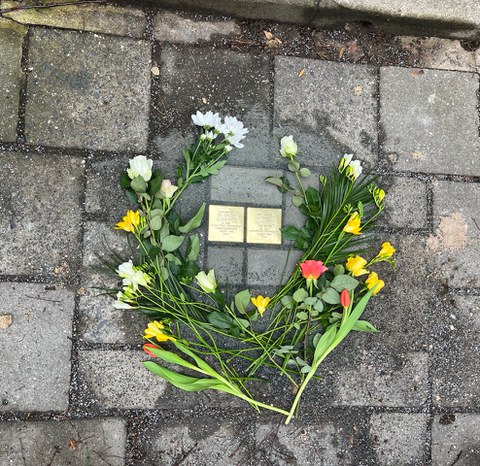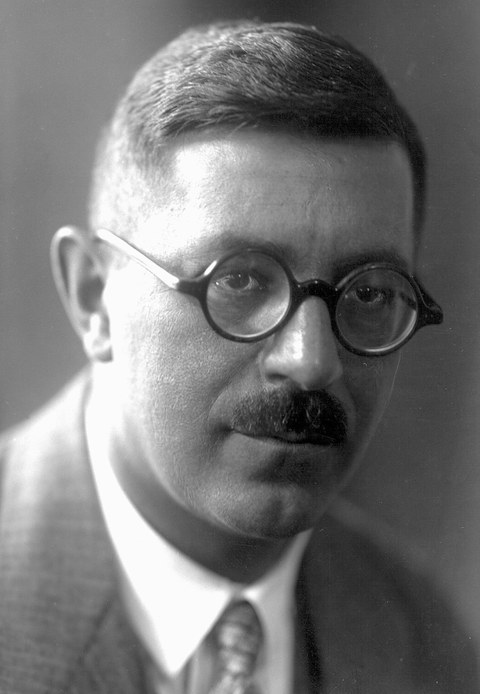Feb 28, 2024
Stolpersteine for Dresden Psychology Professor Walter Blumenfeld and his wife Margarete Blumenfeld
The Stolpersteine für Dresden association has dedicated two memorial stones to Dr. Walter Blumenfeld and his wife Margarete Blumenfeld (née Meyer). Walter Blumenfeld was a major pioneer in the field of work and organizational psychology. After the First World War, he taught general and experimental psychology as a Privatdozent (private lecturer) at the Technische Hochschule Dresden. Later, he was instrumental in founding the Psychotechnical Institute in Dresden. In 1934, Blumenfeld was forced into retirement due to his Jewish heritage.
The Stolpersteine were installed on February 8, 2024 in front of the house at Bayreuther Strasse 4 in Dresden's southern suburbs, where the Jewish couple lived from 1922 until their emigration to Peru in 1935.

v.l.n.r.: Benjamin Kuntz vom Robert-Koch-Institut in Berlin, Dr. Anne Gärtner in Vertretung für den Vorstand der Deutschen Gesellschaft für Psychologie und Dr. Andreas Jüttemann.
The Stolpersteine were initiated by Andreas Jüttemann (TU Dresden) and Benjamin Kuntz of the Robert Koch Institute in Berlin, who have jointly published a book on Blumenfeld's life and work. They were financed by TU Dresden’s Faculty of Psychology and the German Psychological Society. Dr Andreas Jüttemann was very pleased with the large amount of support: "I was thrilled with how lively the participation in the laying of the stumbling blocks was. Almost 50 people came: Residents of the house, neighbours, representatives of Dresden psychology, medical history and the university archives as well as descendants of the Klemperer family. At last there is a memorial to the Blumenfeld couple in Germany. I am pleased and grateful that both the TU Dresden and the German Psychological Society have agreed to support the laying of the stone."
Historical background
Walter Blumenfeld (1882-1967) was a groundbreaking pioneer of work and organizational psychology. Originally from the town of Neuruppin in Brandenburg, Germany, he studied electrical engineering and worked as an engineer for AEG in Berlin. After completing a second degree in psychology and philosophy in 1913, he taught general and experimental psychology as a Privatdozent at the Technische Hochschule Dresden after the First World War. In 1924 he was appointed associate professor and played a decisive role in the establishment of the Psychotechnical Institute in Dresden.
Blumenfeld devoted much attention to the topic of work organization. He coined the “Blumenfeld effect” and developed methods for aptitude diagnostics, including the well-known cube test. He maintained a close friendship with the scholar and diarist Victor Klemperer. After the Nazis rose to power and Blumenfeld was dismissed from his position because of his Jewish heritage, he and his wife emigrated to Peru in 1935. He was appointed Chair of Psychology and Education in Lima. His works, written in Spanish, were widely circulated in South America. Walter Blumenfeld, who was awarded honorary membership of the German Psychological Society in 1949, died in Lima shortly before his 85th birthday.
Media inquiries:
PD Dr. Andreas Jüttemann
TUD Dresden University of Technology
Institute for the History of Medicine
Mobile: +49 176 82034757
Email:



